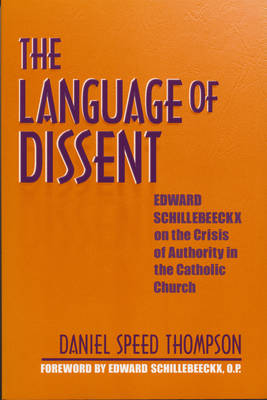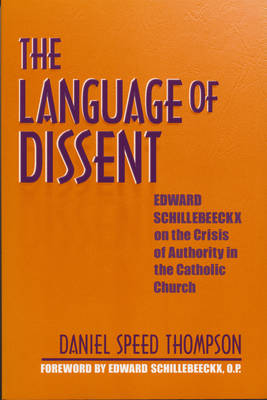
- Retrait gratuit dans votre magasin Club
- 7.000.000 titres dans notre catalogue
- Payer en toute sécurité
- Toujours un magasin près de chez vous
- Retrait gratuit dans votre magasin Club
- 7.000.000 titres dans notre catalogue
- Payer en toute sécurité
- Toujours un magasin près de chez vous
Language of Dissent
Edward Schillebeeckx on the Crisis of Authority in the Catholic Church
Daniel Thompson
Livre broché | Anglais
33,95 €
+ 67 points
Description
Written in the context of a decades-long struggle between progressive theologians and the magisterium-a struggle symptomatic of the current and wider crisis in the Roman Catholic Church-The Language of Dissent uses the theology of Edward Schillebeeckx as it has evolved and developed to analyze fundamental questions of authority and dissent in the church. Daniel Speed Thompson's approach to the issue of authority is unique in that he reflects not only on the character of the church but also on the very nature of salvation, revelation, and theological language. After briefly describing the current crisis of authority in the Catholic Church, Thompson describes the conceptual framework that shapes Schillebeeckx's understanding of knowledge, language, action, and authority. In particular, Thompson demonstrates the complex interrelationship between experience, praxis, and language in Schillebeeckx's three models of epistemology. With these foundations in place, Thompson offers a synthesis of Schillebeeckx's writings on ecclesiology and the apostolicity of the church. Thompson argues that Schillebeeckx's writings in these areas, as well as in epistemology and fundamental theology, not only allow for theological dissent, but actually demand their existence within a healthy church. Thompson concludes by suggesting that the consistent application of Schillebeeckx's principles argue for a democratization of the Roman Catholic Church. Incorporating previously untranslated and new material, as well as a preface, by Schillebeeckx, The Language of Dissent makes a substantial contribution to contemporary Catholic theology.
Spécifications
Parties prenantes
- Auteur(s) :
- Editeur:
Contenu
- Nombre de pages :
- 256
- Langue:
- Anglais
Caractéristiques
- EAN:
- 9780268033590
- Date de parution :
- 30-07-03
- Format:
- Livre broché
- Format numérique:
- Trade paperback (VS)
- Dimensions :
- 155 mm x 228 mm
- Poids :
- 385 g







